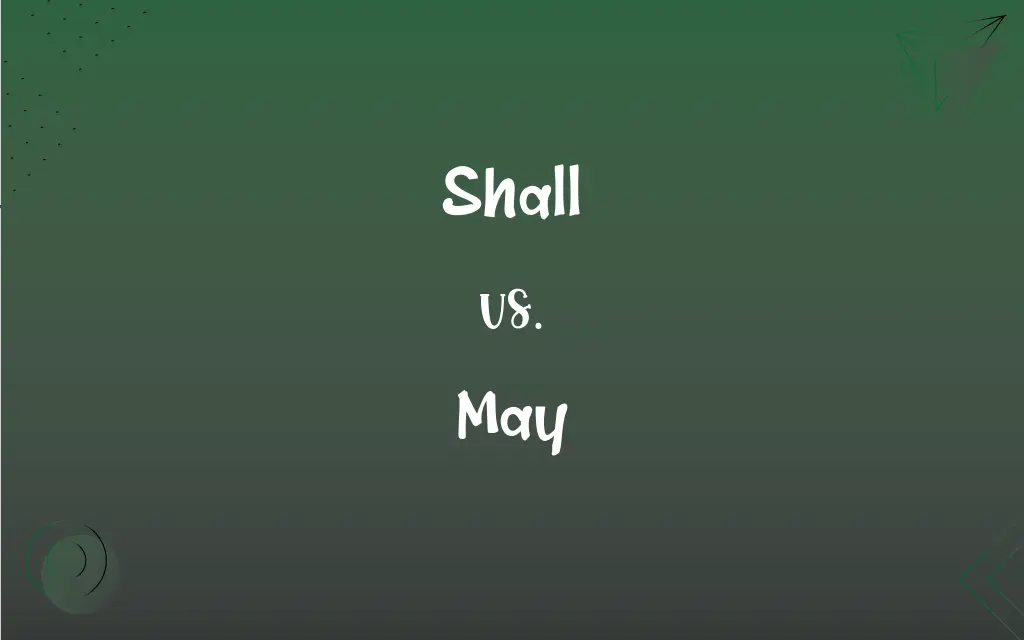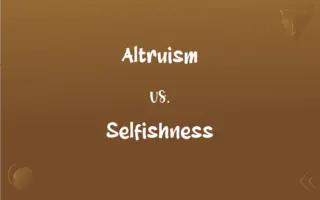Shall vs. May: What's the Difference?
Edited by Harlon Moss || By Janet White || Published on November 4, 2023
"Shall" is often a formal way to indicate future or determination, while "May" expresses possibility or permission.

Key Differences
"Shall" and "May" are both auxiliary verbs, but they serve distinct purposes. "Shall" primarily denotes a future action or an obligation, often with a sense of determination. "May", on the other hand, signifies possibility, likelihood, or permission.
Traditionally, "Shall" was used with first person pronouns to indicate the future. Nowadays, its use has waned in favor of "will". Yet, in legal or formal documents, "Shall" still implies a mandatory nature. "May", conversely, is employed when one wishes to indicate a chance of something occurring or when seeking or granting permission.
In questions, "Shall" sometimes seeks a proposal or suggestion, e.g., "Shall we dance?". "May", when used in questions, often requests permission, like "May I enter?".
"Shall" can convey an authoritative tone, especially in directives or commands. "May", in contrast, has a more tentative quality, leaving room for discretion or choice.
Both "Shall" and "May" have nuanced uses in English, and their correct application often relies on the context of the statement and the intended meaning.
ADVERTISEMENT
Comparison Chart
Primary Use
Indicate future or determination
Express possibility or permission
Formality
Often used in formal or legal contexts
Common in both formal and informal speech
Questions
Seeks suggestion ("Shall we...?")
Requests permission ("May I...?")
Tone
Can be authoritative
Tentative or permissive
Contextual Flexibility
Less common in everyday American English
Widely used across contexts
ADVERTISEMENT
Shall and May Definitions
Shall
Seeks suggestion or proposal in questions.
Shall we go to the park?
May
Denotes a wish or hope.
May you live long.
Shall
Denotes obligation or command.
You Shall not pass.
May
Signifies uncertainty.
He May or may not come.
Shall
Indicates future action (traditionally with "I" and "we").
I Shall return.
May
Expresses possibility.
It May rain today.
Shall
Expresses determination or intent.
We Shall overcome challenges.
May
A hawthorn or its blossoms.
Shall
Used in formal promises or assertions.
I Shall always love you.
May
The fifth month of the year in the Gregorian calendar. See Table at calendar.
Shall
Used before a verb to indicate the simple future tense in the first person singular or plural.
I shall sing in the choir tomorrow.
I hope that we shall win the game.
May
The springtime of life; youth.
Shall
Used similarly to indicate determination or obligation in the second and third persons singular or plural.
(determination): You shall go to the ball!
(obligation): Citizens shall provide proof of identity.
May
The celebration of May Day.
Shall
Used in questions with the first person singular or plural to suggest a possible future action.
Shall I help you with that?
Shall we go out later?
Let us examine that, shall we?
May
To be strong; to have power (over).
Shall
(obsolete) To owe.
May
To be able; can.
Shall
To owe; to be under obligation for.
May
To be able to go.
Shall
To be obliged; must.
May
To have permission to, be allowed. Used in granting permission and in questions to make polite requests.
You may smoke outside;
May I sit there?
May
Expressing a present possibility; possibly.
He may be lying;
Schrödinger's cat may or may not be in the box
May
Expressing a wish (with present subjunctive effect).
May you win;
May the weather be sunny
May
Used in modesty, courtesy, or concession, or to soften a question or remark.
May
To gather may, or flowers in general.
May
To celebrate May Day.
May
The hawthorn bush or its blossoms.
May
(archaic) A maiden.
May
An auxiliary verb qualifying the meaning of another verb,
How may a man, said he, with idle speech,Be won to spoil the castle of his health!
For what he [the king] may do is of two kinds; what he may do as just, and what he may do as possible.
For of all sad words of tongue or penThe saddest are these: "It might have been."
May
Liberty; permission; allowance.
Thou mayst be no longer steward.
May
Contingency or liability; possibility or probability.
Though what he learns he speaks, and may advanceSome general maxims, or be right by chance.
May
Modesty, courtesy, or concession, or a desire to soften a question or remark.
How old may Phillis be, you ask.
May
Desire or wish, as in prayer, imprecation, benediction, and the like.
May
A maiden.
May
The fifth month of the year, containing thirty-one days.
May
The early part or springtime of life.
His May of youth, and bloom of lustihood.
May
The flowers of the hawthorn; - so called from their time of blossoming; also, the hawthorn.
The palm and may make country houses gay.
Plumes that mocked the may.
May
The merrymaking of May Day.
May
The month following April and preceding June
May
Thorny Eurasian shrub of small tree having dense clusters of white to scarlet flowers followed by deep red berries; established as an escape in eastern North America
May
Requests or grants permission.
May I come in?
May
Indicates a specific possibility out of many.
You May win or lose.
FAQs
Which verb is more formal: "Shall" or "May"?
"Shall" is generally considered more formal than "May."
Is "Shall" commonly used in modern English?
"Shall" is less common in modern American English but is still used in formal, legal, and British contexts.
Is "May" always about possibility?
While "May" often indicates possibility, it can also express permission, as in "May I enter?"
Can "Shall" and "May" be used interchangeably?
No, "Shall" indicates future or obligation, while "May" suggests possibility or permission.
How is "Shall" typically used in questions?
In questions, "Shall" often seeks suggestions or proposals, as in "Shall we dance?"
Can "Shall" be replaced by "Will" in modern usage?
Often, "Shall" can be replaced by "Will," especially in indicating the future, but nuances may differ.
How do British English speakers use "Shall"?
British English speakers traditionally use "Shall" with first person pronouns (I, we) to indicate future events.
Is "May" used to express wishes?
Yes, "May" can be used to express a wish or hope, as in "May you have a great day."
What's a polite way to request permission?
"May I" is a courteous and traditional way to seek permission.
Can "May" be used to indicate a possibility among many?
Yes, "May" can indicate a specific possibility out of several, like "You may win or lose."
How is "Shall" used in legal contexts?
In legal texts, "Shall" often denotes an obligation or command.
Can "Shall" indicate intent or promise?
Yes, "Shall" can be used to express a strong intent or formal promise.
Is "May" the only way to request permission?
No, other phrases like "Can I" or "Could I" are also used, but "May I" is traditionally formal and polite.
Is "May" always uncertain?
No, while "May" can express uncertainty, it can also denote sureness when granting permission.
Does "May" have variations in meaning?
Yes, "May" can denote possibility, permission, potentiality, or even a wish.
Is "Shall" imperative in nature?
In certain contexts, especially legal or commanding ones, "Shall" can have an imperative tone.
How is "Shall" used in literature?
In literature, "Shall" can denote future actions, obligations, or even poetic or dramatic intentions.
Are there specific scenarios where "Shall" is preferred over "Will"?
Yes, in formal promises, legal directives, or certain British contexts, "Shall" is often the preferred choice.
Which is more common in everyday speech: "Shall" or "May"?
"May" is more common in everyday American English, while "Shall" is seen more in formal or British English.
What's a synonym for "Shall"?
"Will" is often a synonym for "Shall," especially in indicating the future.
About Author
Written by
Janet WhiteJanet White has been an esteemed writer and blogger for Difference Wiki. Holding a Master's degree in Science and Medical Journalism from the prestigious Boston University, she has consistently demonstrated her expertise and passion for her field. When she's not immersed in her work, Janet relishes her time exercising, delving into a good book, and cherishing moments with friends and family.
Edited by
Harlon MossHarlon is a seasoned quality moderator and accomplished content writer for Difference Wiki. An alumnus of the prestigious University of California, he earned his degree in Computer Science. Leveraging his academic background, Harlon brings a meticulous and informed perspective to his work, ensuring content accuracy and excellence.






































































